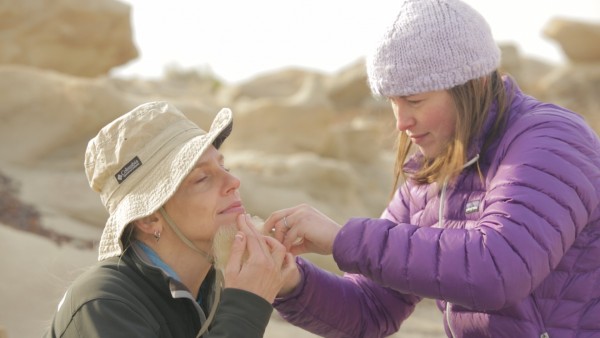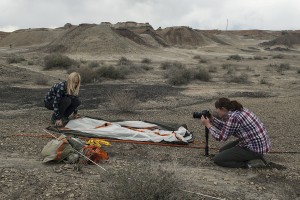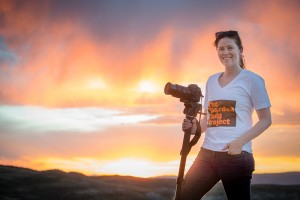30 November 2015
Women don beards for documentary about inequality in the geosciences
Posted by mcadams

Lexi Jamieson Marsh (right) attaches fake facial hair to Lisa Boucher (left) a Paleobotanist Research Fellow and Lecturer at the University of Texas at Austin. “Lisa studies ancient grasslands and was very excited to show us some petrified wood while visiting her field site,” Marsh said. Photo by Kelsey Vance.
By Lexi Jamieson Marsh
“I want to be a paleontologist,” I thought as a kid, probably like many others who yearned to go outside and hunt for fossils. But as the years went on and my dinosaur wallpaper faded in my childhood bedroom, paleontology seemed to be a job for people in books and on television. Then I met Ellen Currano.
Ellen is a real paleontologist. Actually, she is a paleobotanist – she studies plant fossils as an Assistant Professor at the University of Wyoming. To me, Ellen is some superhuman being come to life. She has seen remote areas of the world, battled over a bag of oranges with some feisty baboons, and on a single night, managed to survive dangerous encounters with a severe thunderstorm and a rattlesnake!
That’s why, when Ellen confided in me that she doesn’t feel like she fits the image of a paleontologist, I was speechless. Ellen can never just be one scientist among many, she told me, because she is a woman. She has to disprove the stereotype that women are weak while exhibiting herself as a success story – a woman who can make it in a man’s world – adding pressure to an already intense workload. She can’t just do her work, she has to somehow be more. And, she isn’t the only woman in science to feel this way: only five percent of officers at the Paleontological Society, a professional organization for paleontologists, have been women over the society’s 100-year history.
Like Ellen, I do not look the part of a film director, a job traditionally dominated by men. My existence as one of the few females on set means that everything I say or do will be reasoned based on my gender, for better or worse. In the 87 years of the Academy Awards, only four female directors have ever been nominated for Best Director and only one woman has ever won.

Lexi Jamieson Marsh (right) films Lisa Boucher (left) setting up her campsite in the Bisti/Ne-Na-Zin Wilderness in northern New Mexico in April 2015. “I wanted to document Lisa’s competence in camping,” Marsh said. “Lisa was scheduled to conduct fieldwork with a team later that week, but she was kind enough to arrive a few days early so that our team could set up an interview. After our shoot, Lisa would be camping alone and that was fine with her. I think it’s really important to see women relying on themselves.” Photo by Kelsey Vance.
We women can reference numbers like these to concretize our personal experiences of being outsiders, but the truth is, very few of those in a position of power will look to these numbers as the inspiration to enact the change we so desperately need. We need something more, something a bit avant-garde, and yet something that can still inspire.
One evening while discussing this issue, Ellen exclaimed “I wish I could just walk into the room with a fake beard on my face. That would make my life so much easier!”
At two o’clock the next morning I composed an email to Ellen with the subject “But what if you did wear a beard?” The idea was simple: what if we created a documentary that challenged the stereotypical face of science by featuring women wearing a fake beard while working at their field sites and in their labs? What if? And what if these scientists talked about how they built their careers? What if we they told us about all the steps, all the different paths they had taken to get to the top? What if we made a film that challenged the idea that only one “type” of woman can do this work?
As the project evolved, I realized we needed to do more. Film as a medium might not be enough for the bearded scientists to make the kind of impact I was looking for. But photos, on the other hand, might allow audiences time to contemplate stereotypical gender roles in paleontology. I contacted my friend Kelsey Vance, a fine art photographer, and asked her to take portraits of these women donning beards.
Kelsey took our project to the next level. Using her large format film camera, and developing the images in her home darkroom, Kelsey captured these scientists in their element, producing photos similar to the black and white portraits of their male predecessors that we often see in textbooks.
Our team of collaborators was assembled: Dr. Ellen Currano as our lead subject and scientific consultant, Kelsey Vance as the photographer documenting the women and their worksites, and me, Lexi Jamieson Marsh as the director and producer of the feature-length documentary film.
As of today, we have been working on The Bearded Lady Project for almost a year and a half. We have received funding from the National Science Foundation, the Paleo Society, the University of Exeter, and the Puffin Foundation. We’ll be filming and photographing paleontologists in the new year, concluding this journey at the 2016 Geological Society of America’s annual meeting in Denver, Colorado, this September where we will premiere a selection of the bearded portraits.

Film director Lexi Jamieson Marsh at the end of the first shoot for The Bearded Lady Project in Hanna Basin, Wyoming in, July 2014. “One of the shots I wanted to capture while in the field was a beautiful sunset,” Marsh said.. “Ellen told me I should lower my expectations because there was so little atmosphere. Storms had been brewing all day, forming around the basin. Right at sunset, we experienced one of the most beautiful sunsets I have ever seen in my entire life. Even though we hadn’t showered in five days, we decided to throw on the shirts we had printed and take headshots in front of this beautiful light. This was the night our team recognized that this crazy idea might actually work.” Photo by Draper White.
A fully curated exhibition and documentary film are set to premier in early 2017. In an effort to do all that we can, both film and portrait series will dedicate their proceeds to a scholarship fund to support future female scientists. If you would like to join our project, please email us at [email protected] or visit our website to donate to the project.
While our goal is to challenge the stereotypes that exist for female geoscientists, we are also working towards a broader goal of changing the social view of what women are capable of doing. By making this film and photographic exhibition, Kelsey and I are creating work we are proud of while simultaneously putting ourselves in the leadership position. I never did become a paleontologist, and probably never will, but thanks to a life-long love of paleontology, I am helping women in many different careers establish their voices.
Lexi Jamieson Marsh is a film director, producer and founder of On Your Feet Entertainment. She is based in Oxford, Ohio. Her past documentary work includes “Autonomous” and “From the Ground Up: Inside the Creation of a Charter School” which is currently in post production. For more about Lexi, visit her website.
Follow the Bearded Lady Project on Twitter.


 The Plainspoken Scientist is the science communication blog of AGU’s Sharing Science program. With this blog, we wish to showcase creative and effective science communication via multiple mediums and modes.
The Plainspoken Scientist is the science communication blog of AGU’s Sharing Science program. With this blog, we wish to showcase creative and effective science communication via multiple mediums and modes.
Bearded lady! That sounds interesting! I am a man and fond of beard related stuffs. The things with fake and real beard is just a situation apart. To deal with real beard is a challenge and for that beards have to be groomed and managed well.
http://www.beard-growth.com/Beard-Spray/